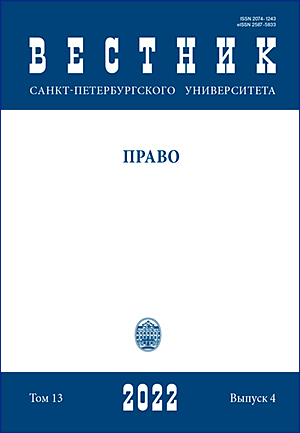Defining the employment discrimination: International labor standards and the Russian approach
DOI:
https://doi.org/10.21638/spbu14.2022.413Abstract
The article contains an analysis of approaches to the definition of employment discrimination from the point of view of compliance of Russian legislation and case-law with international labor standards. The prohibition of discrimination includes ensuring equal opportunities for employees, which sometimes implies the provision of additional guarantees for certain categories of employees (affirmative action). The problem with such affirmative action norms established by law is that they themselves can be discriminatory. The courts’ qualification of discrimination is inevitably judgmental and is based both on the values of society and on the subjective opinion of the judge. In this regard, it is important to understand the boundaries between legal differentiation and illegal discrimination according to international labor standards. The article deals with certain aspects of the Russian affirmative action norms in employment which subject to debates regarding their discriminative nature. The norms concerning parental leaves granted only to male military personnel, the list of professions with harmful and dangerous working conditions prohibited for women, the restriction of dismissal of pregnant women at the initiative of the employer (in comparison with the norms on protection from dismissal of trade union activists and parents of disabled children), the ban on dismissal of elderly employees, as well as the possibility of concluding fixed-term employment contracts with them are analyzed and evaluated in the article. The article draws conclusions about the need to harmonize the approaches of the Russian legislation and case-law on these issues with international labor standards developed within the framework of the International Labour Organisation, the United Nations and the Council of Europe.
Keywords:
employment discrimination, affirmative action, equality of opportunities, protection from dismissal, dismissal of pregnant women, lists of prohibited professions, fixed-term employment contract, elderly employees, labor disputes
Downloads
References
Downloads
Published
How to Cite
Issue
Section
License
Articles of "Vestnik of Saint Petersburg University. Law" are open access distributed under the terms of the License Agreement with Saint Petersburg State University, which permits to the authors unrestricted distribution and self-archiving free of charge.






